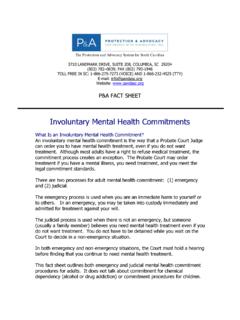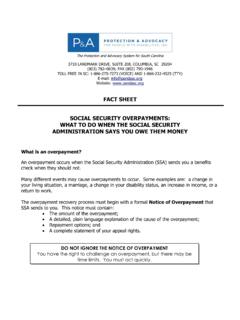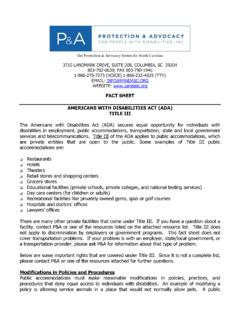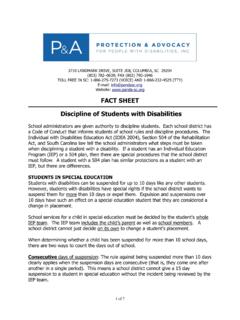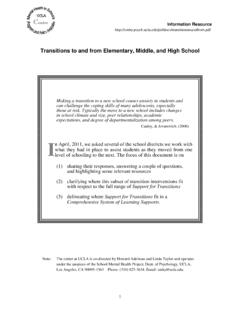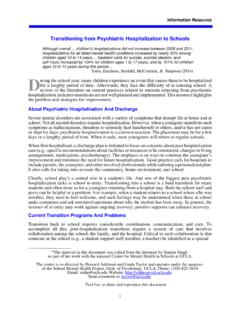Transcription of SCHOOL TRANSITION SERVICES - P&A
1 The Protection and Advocacy System for South Carolina 3710 LANDMARK DRIVE, SUITE 208, COLUMBIA, SC 29204 803-782 0639; FAX 803-790-1946 TOLL FREE IN SC: 1-866-275-7273 (VOICE) AND 1-866-232-4525 (TTY) E-mail: Website: P&A FACT SHEET SCHOOL TRANSITION SERVICES What are TRANSITION SERVICES and why are they important? Parents naturally worry about their children s future. They want to make sure their children are ready for work, college, living on their own and all the other things that come after high SCHOOL . TRANSITION SERVICES help prepare students with disabilities for adult life. Many students with disabilities drop out of SCHOOL but are not ready for the adult world. If a student has an individualized education program (IEP), SCHOOL districts must provide SERVICES to help the student move from SCHOOL to post-high SCHOOL activities.
2 TRANSITION SERVICES can be used to help students get ready for: College Tech SCHOOL Work Adult education Adult SERVICES Living on their own Participating in their community When do TRANSITION SERVICES start? South Carolina law requires TRANSITION SERVICES to start when the student turns TRANSITION planning must be done before the student s 13th birthday. For students who are in special education, their IEP must include a statement of goals for the student after high SCHOOL and the TRANSITION SERVICES needed to reach these goals. 12 SC Code Ann. Regs 43-243 (IV)(D)(1)(b)(2011): TRANSITION SERVICES may be included at ages younger than thirteen if considered appropriate by an IEP team.
3 2 Who should be a part of TRANSITION planning? The most important person for TRANSITION planning is the student. The plan should be based on the student s needs. The team should take into account what the student is good at, what the student likes, and what the student wants to do after SCHOOL . TRANSITION planning should also include input from: Teachers Parents SCHOOL district TRANSITION experts (Examples: TRANSITION coordinators or career specialists) Others who work with the student (Examples: therapists or counselors) Outside agencies who work with adults (See next section for examples) Someone from the SCHOOL district who can make decisions about paying for things on the TRANSITION plan. What outside agencies should be involved in TRANSITION planning?
4 SCHOOL districts should invite outside agencies who work with adults to help with student TRANSITION planning. These outside agencies should start helping while the student is still in SCHOOL . Many agencies provide important TRANSITION SERVICES , like job coaching, help with finding a job, help living on your own, etc. If no one from the adult service agency comes to the meetings, the SCHOOL district should take other steps to get the agency to help. Examples of adult service agencies include: SC Vocational Rehabilitation Department SC Department of Mental Health SC Commission for the Blind Disabilities & Special Needs Board Note: If the student receives Social Security Disability (SSDI) or Supplemental Security Income (SSI) benefits, the student may want to contact Community Work Incentives Coordinators (CWIC).
5 They are specially trained counselors funded by Social Security to assist SSI and SSDI recipients make informed choices about working. To receive help from a CWIC, contact Walton Options at 803-279-9611 or on line at: Also, if you are a client of SC Vocational Rehabilitation Department (VR) you may contact your VR counsellor for Benefits Planning information. What should TRANSITION plans include? The student s IEP must include: Goals to help the student be ready for what comes after SCHOOL Classes that will help the student be ready for adult life (also known as course 3 of study ) SERVICES to help the student be ready for adult life Who is responsible for getting each thing done SCHOOL districts can offer SERVICES like: Teaching the student how to write a resume Counseling or therapy to help the student be ready to work Visiting a job site Teaching the student daily living skills Teaching the student how to understand work evaluations Teaching how to request disability accommodations at college or tech SCHOOL How can the SCHOOL district find out the student s interests?
6 The SCHOOL district must do an assessment that is appropriate for the student s age. The assessment will include talking with the student and the parents. It should also include testing to provide information about the student s: Interests Personality Physical ability Mental ability Classroom learning style Potential in an area of work If the student is working, there should be a report based on an observation of performance at work. For more information, students and parents can visit the National Secondary TRANSITION Technical Assistance Center: What is an individual graduation plan? A South Carolina law2 seeks to make graduation rates higher and drop-out rates lower. Schools must now provide students experience with real-world problem-solving skills and work opportunities.
7 Under the law, all students must have an individual graduation plan by the end of 8th grade. The individual graduation plan should help the student TRANSITION into work, work training, or college. The individual graduation plan must: Make sure that the student s work goals match the classes ( course of study ) the student is taking 2 South Carolina Education and Economic Development Act passed in 2005 and schools were to comply by July 2011. SC Code of Laws Ann. 59-59-10 to 59-59-250 (2011 Supp.) 4 Be based on the student s work interests ( cluster of study ) Include academic subjects to make sure the student can graduate Include work experiences (Examples: internships and mentoring) Be flexible to allow change in the student s work interests Include parts of the student s IEP when appropriate Be approved by a certified SCHOOL guidance counselor and the student s parents or guardians Who should be involved in developing the individual graduation plan?
8 Schools should include the special education teacher in the development of the individual graduation plan. Also, middle schools and high schools must provide students with the SERVICES of a career specialist to help students with SCHOOL -to-work activities. The career specialist should also help students become aware of different types of work ( career clusters ).3 What is a summary of performance? A summary of performance is a report that shows what the student has learned in SCHOOL and what the student is able to do. The SCHOOL district does this report for students with IEPs who age out of special education SERVICES (age 21) or graduate with a high SCHOOL diploma. It is usually done the last two years a student is in high SCHOOL . The report must suggest how to help the student be ready for the things he or she wants to do after SCHOOL .
9 The student then decides whether to share the report with colleges, adult agencies, vocational and rehabilitative centers, employers, and others. How can a student let colleges know about his or her disability needs? Colleges and tech schools do not have to find students with disabilities and offer them help. The student needs to tell the college or tech SCHOOL that he or she has a disability and ask for help. If the college or tech SCHOOL gets money from the federal government it cannot discriminate against students based on their disability. Almost all colleges and tech schools get money from the federal government. Most have an office called Disability Student SERVICES to help students with disabilities. What are some things a student might ask the college or tech SCHOOL to do?
10 What the student asks for will be based on the student s disability and individual needs. Examples can include: Letting the student take a reduced course load 3 South Carolina Department of Education, Career Cluster Guides: 5 Arranging for someone to take notes Allowing tape recorders Sign language interpreters More time to take a test Special computer software What proof must the student provide to the college? Colleges or tech schools may require proof of the student s disability and that the student needs help. Some schools require more proof than others. Examples may include: The name of the student s disability A report from the expert who decided the student has this disability An explanation of how the expert made this decision How the disability affects the student s life How the disability affects the student in SCHOOL A copy of an IEP or Section 504 plan from high SCHOOL is generally not enough proof for a college or tech SCHOOL .
